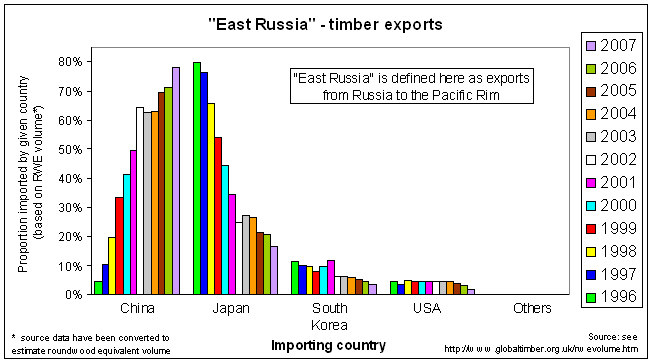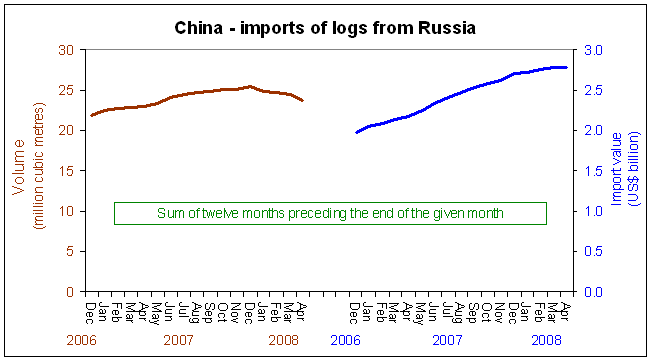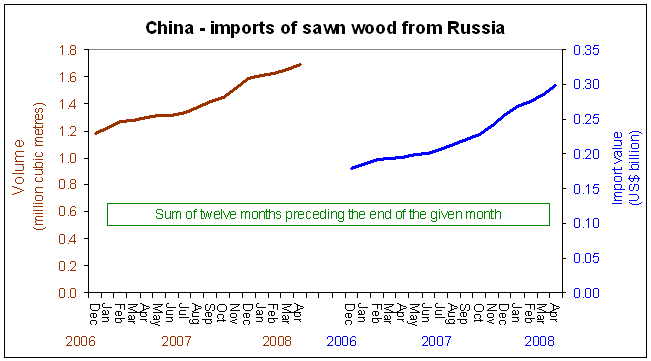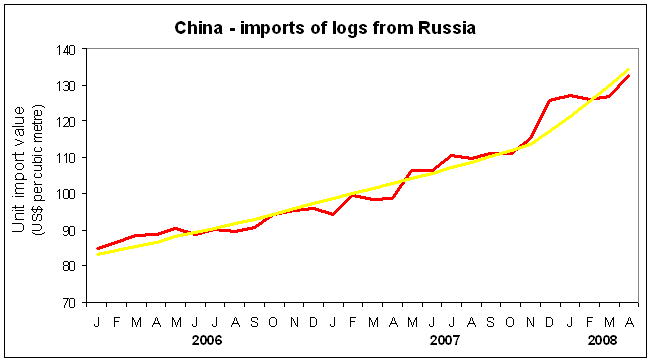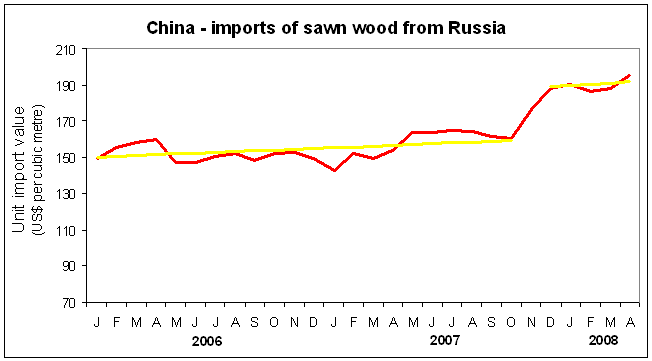|
|
||
|
|
||
|
East
Russia
|
||
|
Source of the four above charts: China Customs |
||
|
During 2007 and by RWE volume, China imported almost 60% of Russia's pulp exports. Commendably, the majority of this was from an FSC-certified mill. Russia, which supplied almost 60% of China's timber imports (by RWE volume) during 2007, has a commanding negotiating position relative to China. Although it has been a "seller's market" since China started (in 1998) to impose a ban on logging in natural forest, unit import values in China have only recently begun to reflect this - implying that those running eastern Russia's timber industry (including organised crime) used to have little interest in maximising their income. Although a number of China's most reputable timber companies have sought to trace their timber imports from Russia back to their forest of origin, intimidation by Russian suppliers has tended to make doing so unacceptably dangerous (both physically and commercially). However, this does not seem to have prompted such companies to procure their wood raw material elsewhere. Indeed the profits to be had from dealing in such timber have attracted investment from the USA, most notably in the construction of an engineered flooring mill in Heilongjiang. Unfortunately, Russia's exports of hardwood to China are particularly likely to be illegal - adding the probability that China's exports of non-tropical hardwood flooring (notably white oak) include Illegal Timber. It would be reasonable to deem as illegal any subsantial quantity of products whose chain of supply can not - with an acceptable level of due diligence - be traced back to the source forest. Japan, having previously imported three quarters of the timber exports of eastern Russia and being unhappy that China now dominates timber production in that region, has only itself to blame. Like France in the Congo Basin, Japan had plenty of opportunity to protect its lucrative sources of supply by ensuring that forest administration in the region was robust and not corrupt - an elementary business failing. That said, one of Japan's leading importers of Russian timber, Sumitomo Corporation, is partnering one of eastern Russia's few large FSC-certified (but nevertheless controversial) logging companies, TerneyLes. The share of Russian timber in Japan's plywood market is rising fast - at the expense of tropical plywood (which the industry in Japan used to say was the only plywood good enough for Japan's construction sector - no doubt to deflect criticism of the social, environmental and economic damage which its procurement practices facilitated). The trends shown in the four lower charts illustrate the response of importers in China to the imposition of a resolution of the Russian government to greatly increase export tariffs in three stages. The trends for specific commodities, such as oak logs, might be different from those shown. The volume of log imports has started to decline. The annual rate of increase in the unit import value of those logs changed from almost 20% prior to December 2007 to 50% thereafter - i.e. the unit price has increase further than the sum of the increases in export tariff (of 20% and 25% or at least Euro10/m3 and Euro15/m3 respectively) on 1st July 2007 and 1st April 2008. The rate of increase in volume of sawn wood imports has tended to match that for import value, except towards the end of 2007 when there was an abrupt (c.20%) increase in unit value. It is likely that local negotiations will enable importers in China evade the full imposition of those export tarrifs - but this, given the implicit corruption involved, would increase the already considerable risk that China's imports of logs from Russia will be illegal. |
||
|
Copyright
globaltimber.org.uk
|

